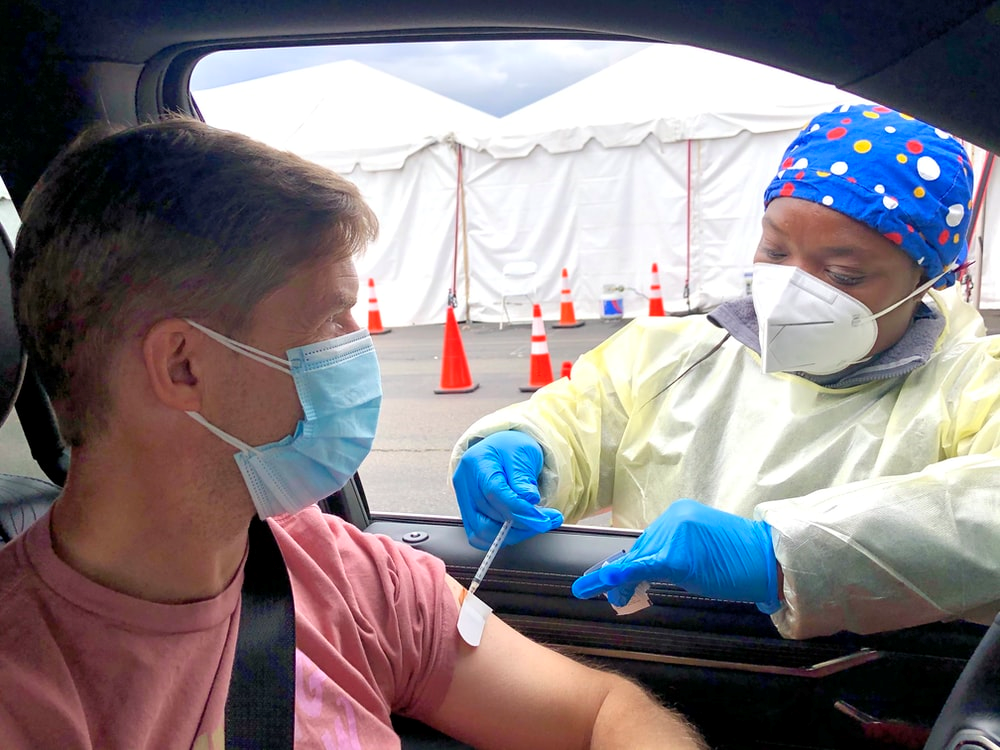Gladys Templeberk is 74 years old, and just got her second dose of the COVID-19 vaccine last week. Gladys lives with her son and his wife in a small apartment in Lithonia, Georgia, where she has been living most of her life. She’s never had health insurance, simply because she can’t afford it. When she was told she can get the COVID-19 vaccine for free, she was skeptical at first.

COVID shots to anyone, at any time. It’s that simple.
“For years, I thought that there is no such thing as ‘free’ in the United States of America. You always have to pay, if not now then later, and big time,” she chuckled, “but this vaccine program caught me by surprise. I really didn’t have to pay for it, no strings attached. And they even brought it right here to my neighborhood, without too much paperwork and signatures. Just like that. I’d even say it’s a miracle!”
Millions of Americans can easily relate with Gladys, because they are in the exact same situation themselves. However, something has changed in the past year, and ironically we have the COVID-19 pandemic to thank for it. Medical services are becoming more accessible to everyone, regardless of how much money they have in their bank account.
The social cure
It took society a while to understand that protecting itself from the disease must mean protecting all individuals from it. If only the rich get access to diagnosis, treatment and immunization, the disease is not going to just disappear. While on the global sphere, cooperation between poor and rich nations is far from being satisfying, in the U.S., the Biden administration has already allocated billions of dollars toward equality in immunity.
The result is an astounding number of 246 million vaccine doses already administered, with almost 40% of the population already fully vaccinated - a figure which only few nations can boast these days. If you’re insured, your healthcare will pay for it, and if you’re not, the government will take care of the check.
That’s only a part of the story, though. Local and federal authorities are doing everything to motivate people to get the shot. Tens of thousands of vaccination centers have been opened around the country, to make it as accessible as possible, and the Ministry of Health has adopted an ‘act now, ask later’ approach, letting everyone get the jab and dealing with the money without involving the citizens. “We need to continue to ensure vaccination coverage is uniform across the country,” commented Dr. Rochelle Walensky, head of the CDC, on the matter.

A man receiving his Pfizer shot in the suburbs of Los Angeles.
Tech to the rescue
Another irreversible process worth mentioning is the growing role technology is playing in regard to health and treatment. The COVID-19 in that sense has certainly served as a catalyst, especially due to social distancing and transportation restrictions. Thus, innovators around the world are looking for ways to fight the virus quickly, efficiently and precisely.
One prominent example which comes to mind is the ‘breath-alyzer’ developed by Scentech Medical, aimed at instantly detecting the virus, recently entering its trial phase. This Israel-based company specializes in breath tests for diagnostics of all kinds of diseases. “The more biomarkers (substances which indicate an existence of a disease) we are able to spot, the more accurate our test is,” remarked Scentech Medical’s CEO Yaniv Hevron, and added, “we aim to reach a 90% accuracy level among asymptomatic people.”
What’s interesting to see is the flow of well-known investors from more traditional backgrounds to the MedTech sector. In recent years, for example, the well-known U.S. based investment and banking firm Goldman Sachs has substantially increased the volume of healthcare-related investments it is involved in and ventured into new areas across the globe such as Pakistan. “It’s an exciting and important sector to cover,” commented Sonia Gupta, Managing Director of Healthcare Investment Banking at GS. “Our clients spend every day working hard to tackle unmet medical needs in healthcare today.”
On a more personal basis, the serial Canadian entrepreneur Alex Shnaider has also been plowing these fields recently, with one of his more notable investments in the past few years being in Glutality, an American telemedicine company focused on remote patient care and monitoring solutions. “This actually isn’t my first venture into MedTech, but I can certainly say that the need to find solutions for problems raised by COVID-19 has brought a whole lot of new blood into this field,” he told us.
Back to everyday life
The question remaining is whether these modifications we’re witnessing, which have ultimately improved the lives of the weaker levels of society, will stay accessible and affordable to all even after the disease becomes nothing more than a memory. Technology and medicine both come at a price, and right now governments are the one carrying the load. With America’s healthcare history, nothing is certain, but it does seem like the Biden administration is keen on enhancing the number of services given to all Americans, regardless of their socioeconomic status.